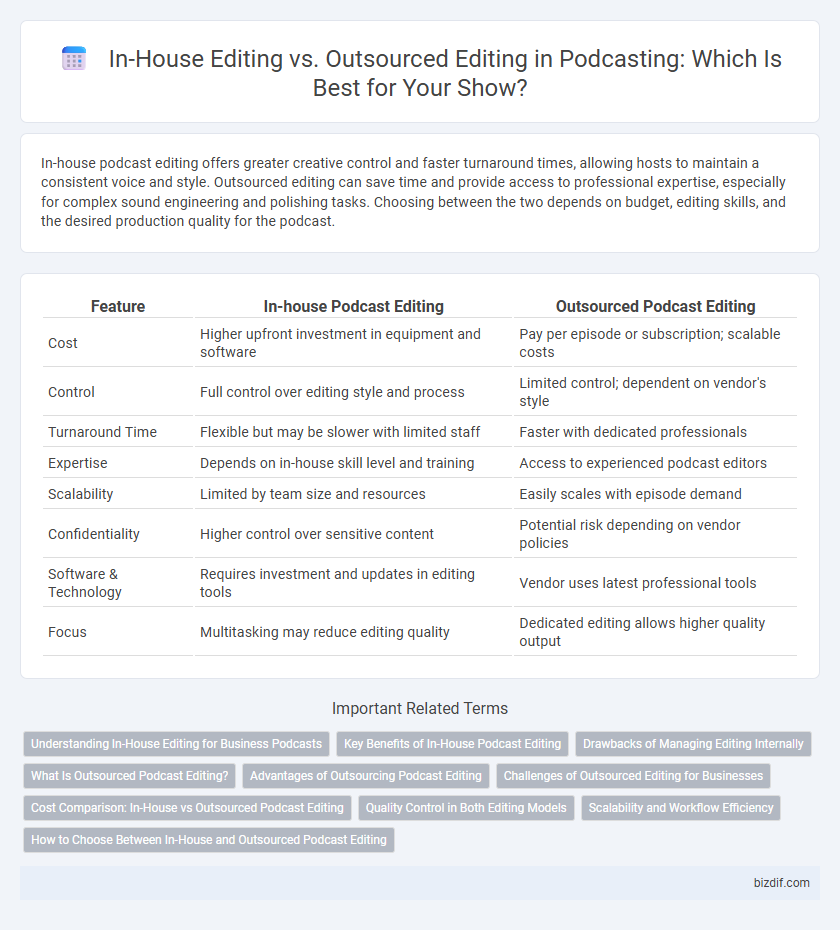In-house podcast editing offers greater creative control and faster turnaround times, allowing hosts to maintain a consistent voice and style. Outsourced editing can save time and provide access to professional expertise, especially for complex sound engineering and polishing tasks. Choosing between the two depends on budget, editing skills, and the desired production quality for the podcast.
Table of Comparison
| Feature | In-house Podcast Editing | Outsourced Podcast Editing |
|---|---|---|
| Cost | Higher upfront investment in equipment and software | Pay per episode or subscription; scalable costs |
| Control | Full control over editing style and process | Limited control; dependent on vendor's style |
| Turnaround Time | Flexible but may be slower with limited staff | Faster with dedicated professionals |
| Expertise | Depends on in-house skill level and training | Access to experienced podcast editors |
| Scalability | Limited by team size and resources | Easily scales with episode demand |
| Confidentiality | Higher control over sensitive content | Potential risk depending on vendor policies |
| Software & Technology | Requires investment and updates in editing tools | Vendor uses latest professional tools |
| Focus | Multitasking may reduce editing quality | Dedicated editing allows higher quality output |
Understanding In-House Editing for Business Podcasts
In-house editing for business podcasts offers greater control over content quality and brand consistency, enabling teams to tailor episodes to specific audience preferences with direct oversight. It streamlines communication between production and marketing departments, accelerating turnaround times and facilitating immediate adjustments based on company objectives. Leveraging skilled internal editors also enhances confidentiality and intellectual property protection compared to outsourcing.
Key Benefits of In-House Podcast Editing
In-house podcast editing offers greater control over the creative process, enabling editors to fine-tune content to match the brand's voice and style consistently. It allows for faster turnaround times since the team is dedicated and immediately available, reducing delays commonly associated with outsourcing. Cost efficiency is another key benefit, avoiding recurring fees and fostering skill development within the organization.
Drawbacks of Managing Editing Internally
Managing podcast editing internally often leads to prolonged production times due to limited in-house expertise and resource constraints. Internal teams may struggle with maintaining consistent audio quality and mastering technical aspects, resulting in subpar listener experience. Increased workload on staff can cause burnout and divert focus from core content creation and marketing efforts.
What Is Outsourced Podcast Editing?
Outsourced podcast editing involves hiring external professionals or agencies to handle the post-production process, including audio cleanup, mixing, and mastering. This approach allows podcasters to save time and leverage expert skills in sound engineering, ensuring high-quality episodes without investing in specialized equipment or software. Outsourcing editing can also streamline workflow, enabling creators to focus more on content creation and audience engagement.
Advantages of Outsourcing Podcast Editing
Outsourcing podcast editing leverages specialized expertise, ensuring professional sound quality and efficient turnaround times that elevate episode consistency and listener experience. It allows podcasters to focus on content creation and audience engagement by delegating technical tasks to experienced audio engineers with access to advanced editing tools. Cost-effective scalability and access to updated industry standards make outsourced editing a strategic investment for growth and competitive differentiation in the podcasting market.
Challenges of Outsourced Editing for Businesses
Outsourced podcast editing presents challenges such as inconsistent audio quality due to varying editor expertise and communication barriers that can delay project timelines. Businesses often struggle with data security risks when sharing sensitive content externally and face difficulties aligning the final product with their brand voice without direct oversight. These issues may lead to increased revision cycles and higher long-term costs despite initial savings.
Cost Comparison: In-House vs Outsourced Podcast Editing
In-house podcast editing often incurs fixed costs such as salaries, software licenses, and equipment, which can be substantial for small teams. Outsourced editing typically operates on a variable cost model, charging per episode or hour, making it scalable and potentially more cost-effective for podcasters with fluctuating workloads. Evaluating cost efficiency depends on episode frequency, editing complexity, and long-term production goals.
Quality Control in Both Editing Models
In-house podcast editing allows for direct quality control with immediate feedback and tailored adjustments that match the show's specific style and voice. Outsourced editing often brings specialized expertise and advanced tools, but requires clear communication channels to maintain consistent quality standards throughout the production process. Balancing cost, turnaround time, and editorial precision is key to achieving high-quality podcast episodes in both models.
Scalability and Workflow Efficiency
In-house podcast editing offers greater control over content quality and facilitates immediate feedback, enabling teams to quickly implement changes and maintain brand consistency. Outsourced editing services provide scalability by handling larger volumes of episodes without burdening internal resources, allowing podcasters to focus on content creation and marketing. Workflow efficiency improves when clear communication protocols and project management tools are integrated, ensuring timely delivery and reducing bottlenecks in both in-house and outsourced editing processes.
How to Choose Between In-House and Outsourced Podcast Editing
Choosing between in-house and outsourced podcast editing depends on factors such as budget, control over the editing process, and desired turnaround time. In-house editing allows for more creative control and quicker revisions but requires investment in skilled personnel and editing software. Outsourced editing offers access to professional expertise and scalability while potentially reducing internal workload and fixed costs.
In-house editing vs Outsourced editing Infographic

 bizdif.com
bizdif.com